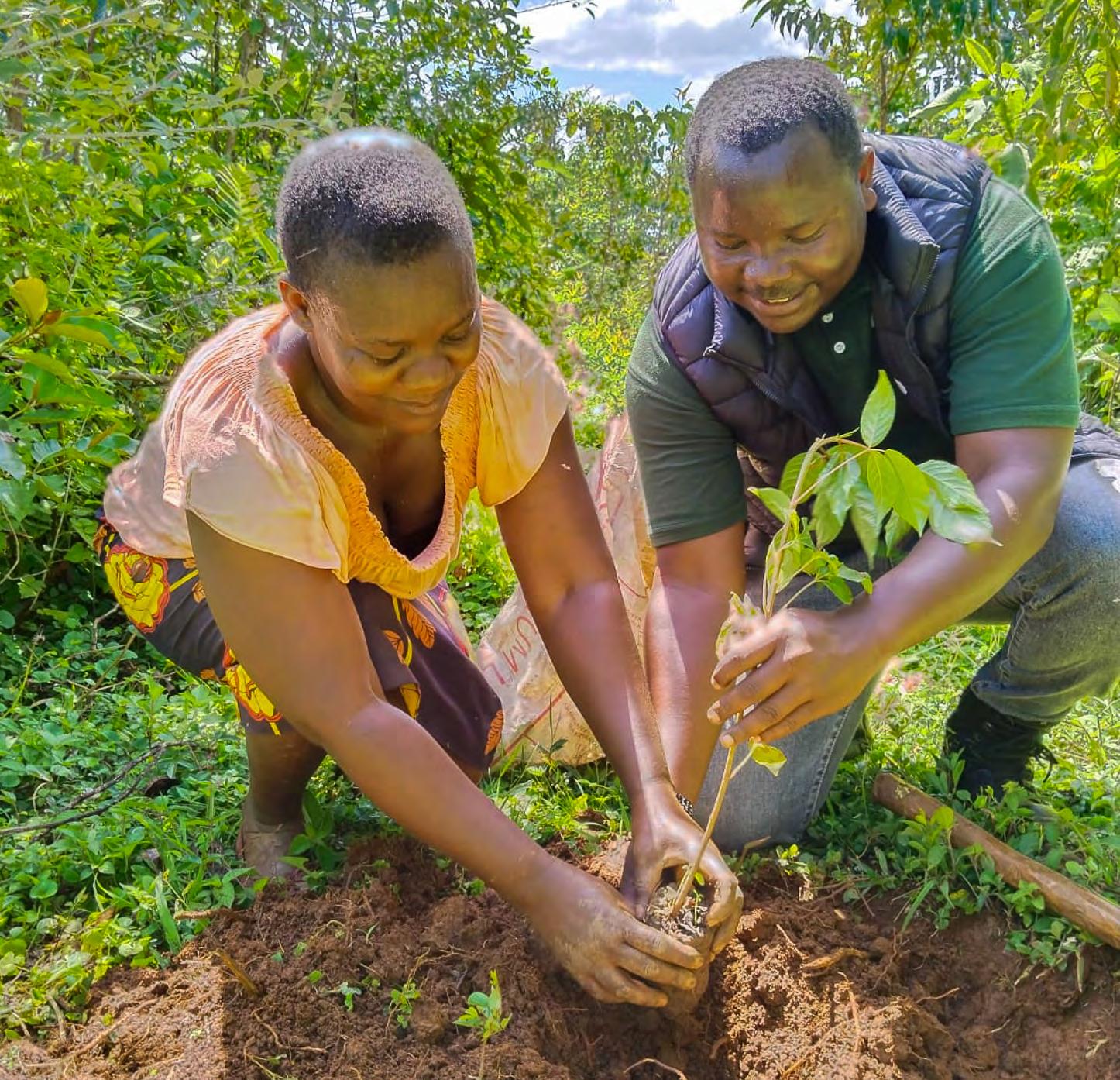




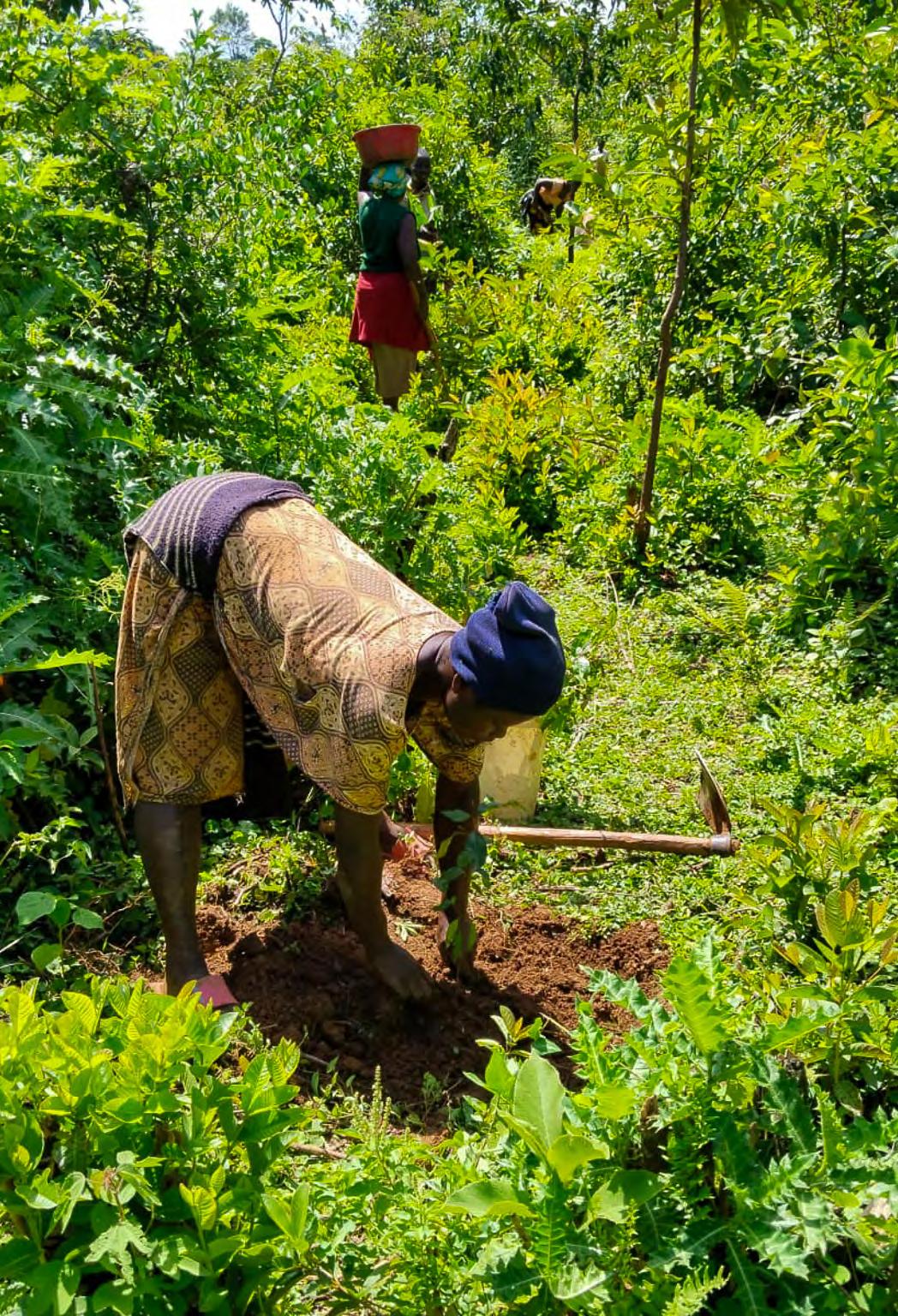
We work with local communities to plant trees and restore forests in places where, together, we can make the fastest, most lasting impact for communities and the future of our planet. Patron His

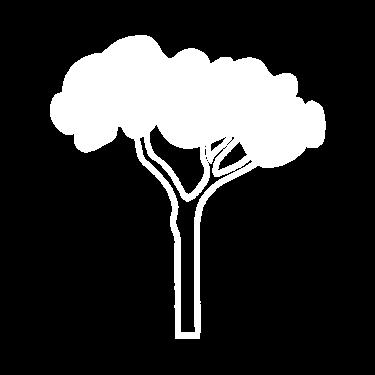
1,491,530 wonderful trees planted and growing
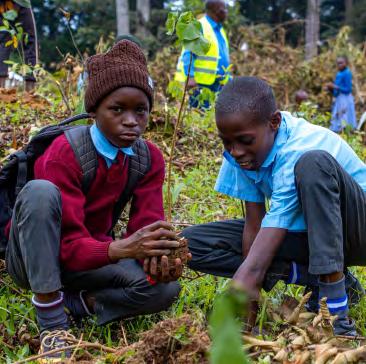
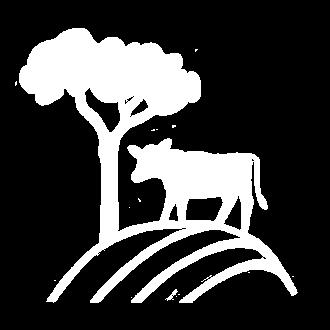
106 community organisations increased forestry and agroforestry capacity
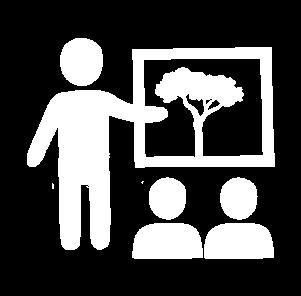
28,125 young people learned about our environment and conservation
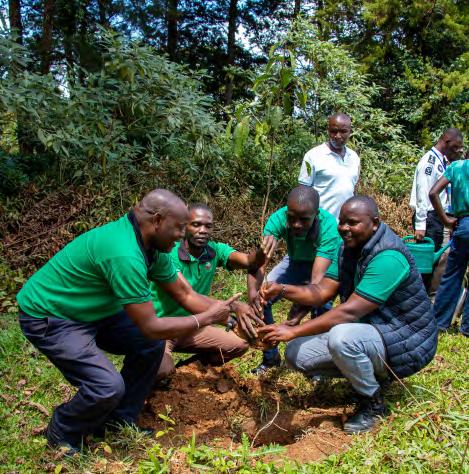
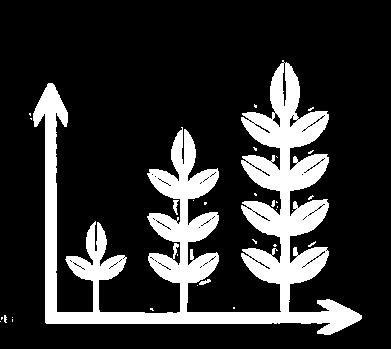
4,499 hardworking smallholder farmers increased their yield

58 projects increased vital biodiversity or ecosystem services
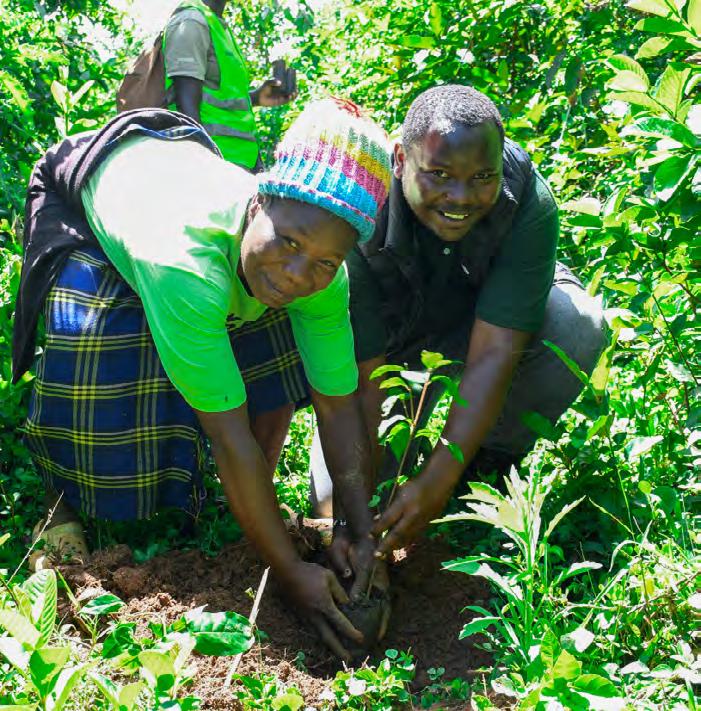
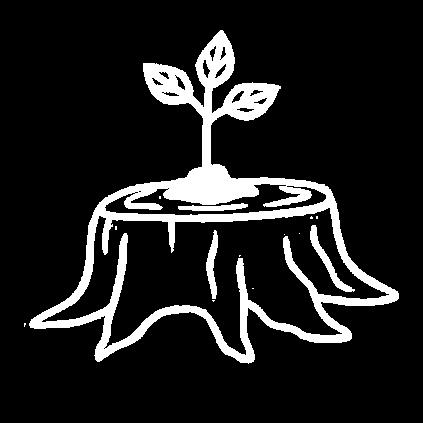
1,354 crucial hectares of forest conserved or restored
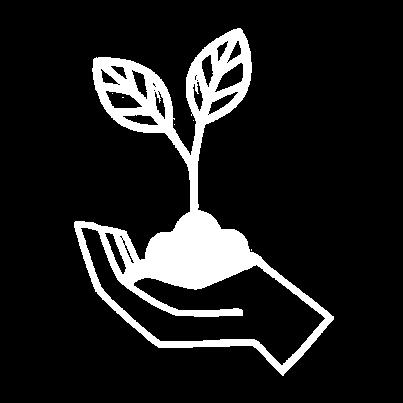
7,831 families increased their household income
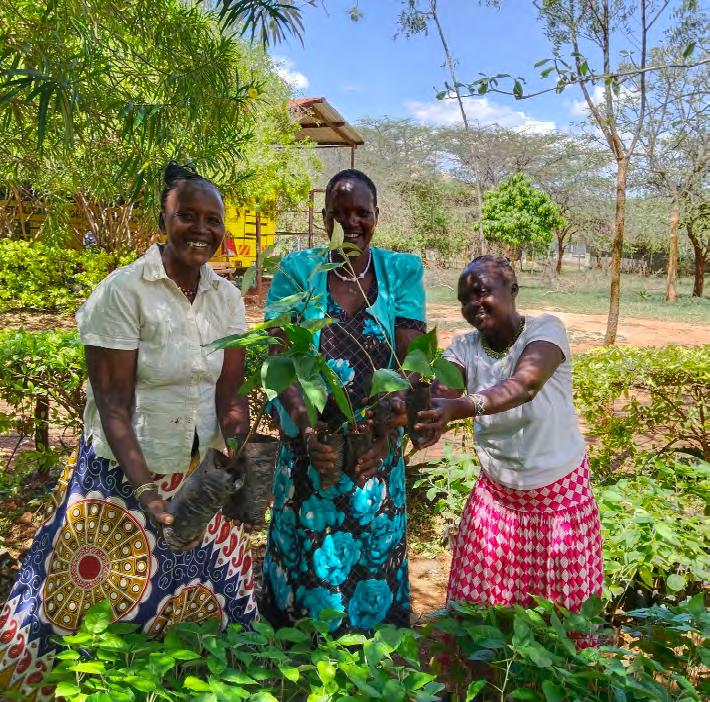

60,304 people reached through awareness campaigns
At ITF, everything we do is driven by a commitment to creating meaningful impact where it matters most.
For over a century, a golden thread has run through our work – putting communities at the heart of restoration. We know that when we work hand in hand with local communities, supporting their vision for their landscapes, we see lasting change on the ground. This Impact Report reflects that commitment.
It highlights how our close partnerships with communities and supporters are making a tangible difference. The number of trees planted, the farmers increasing their yield and household income, and the local organisations strengthening their capacity all stand as a testament to the power of this collective effort of transforming landscapes and improving livelihoods.
In Africa, we work alongside those most vulnerable to climate change in ecologically sensitive areas. Partnering with grassroots organisations, we ensure lasting change through careful monitoring and ongoing support. By blending local knowledge with new technologies and technical expertise, we have achieved powerful results.
Women like Jane in Kitui, Kenya, are increasing their earnings through tree grafting. For Bwahinda in Uganda, kitchen gardens and trees are improving food security. In Saiwa in Kenya, wildlife, including antelope and primates, is returning. In arid areas like Marsabit in Kenya, water harvesting is boosting tree survival. Across all our projects, native seedlings are nurtured and planted to secure long-term benefits – capturing water, stabilising soil, and restoring ecosystems.
In the UK, our work spans rewilding initiatives, community orchards, urban tree planting, and community land buyouts.
We extend our deepest thanks to all our partners worldwide who make this work possible. Together, we have achieved incredible milestones in 2024.
Looking ahead, we remain committed to supporting more communities in realising their visions and delivering meaningful, lasting impact.
James Whitehead, CEO

We know that trees are powerful and when they’re planted properly, they transform landscapes and lives.
So we focus our efforts where they’re needed most – places with threatened ecosystems, endangered tree species and climate vulnerable communities.
Following a holistic approach, we collaborate with communities and partners to tackle social, economic, and environmental challenges together.
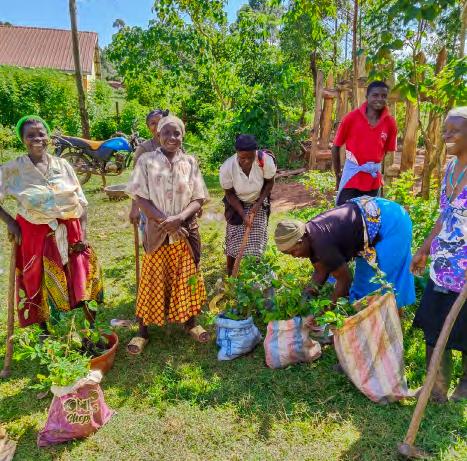
Our approach ensures an impressive 80% or higher tree survival rate.
Communities identify their needs and ideas. And together we implement practical, locally-driven solutions that include everyone—especially women, young people and vulnerable groups.
By involving communities and using cutting-edge GIS technology, we collect real-time data to track progress, learn what’s working and improve as we go.
At ITF our projects focus on:
Highlands
Safeguarding vital water towers and key biodiversity hotspots.
Wetlands
Protecting areas teeming with rich biodiversity.
Drylands Fighting desertification and restoring life to arid landscapes.
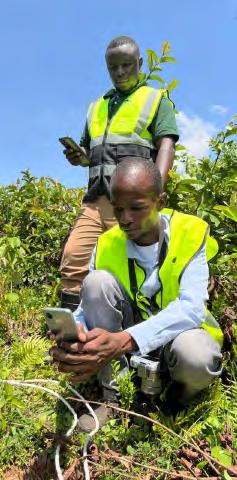
Our mission goes beyond planting trees. We’re helping communities thrive with better livelihoods, stronger economies and healthier ecosystems.
We combine indigenous knowledge, scientific methods and work to international standards to propagate, plant and protect endangered and threatened native trees.
• Combat the devastating effects of climate change
• Improve soil and yields
• Provide shelter and food for people and wildlife
• Restore or protect existing forests
• Restore ecosystems and allow biodiversity to flourish
• Improve access to vital resources like fuel and medicine
• Help advance gender justice
• Equip people with sustainable livelihoods.
Teaching people to grow trees and create their own nurseries provides a new income source while the trees themselves produce nuts, fruit and other resources which can be sold.
When trees are planted on farms, they improve the soil which leads to higher yields. Trees also give shelter and food for livestock and wildlife.
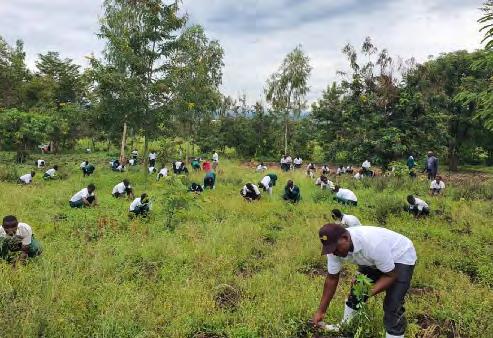
Thousands of communities depend on forests for food, medicine and firewood. Planting trees improves access to these vital resources and protects ancient woodlands against deforestation.
In many communities women have little agency over land while carrying the burden of tending it. Through education and training, forest restoration can help advance gender justice.
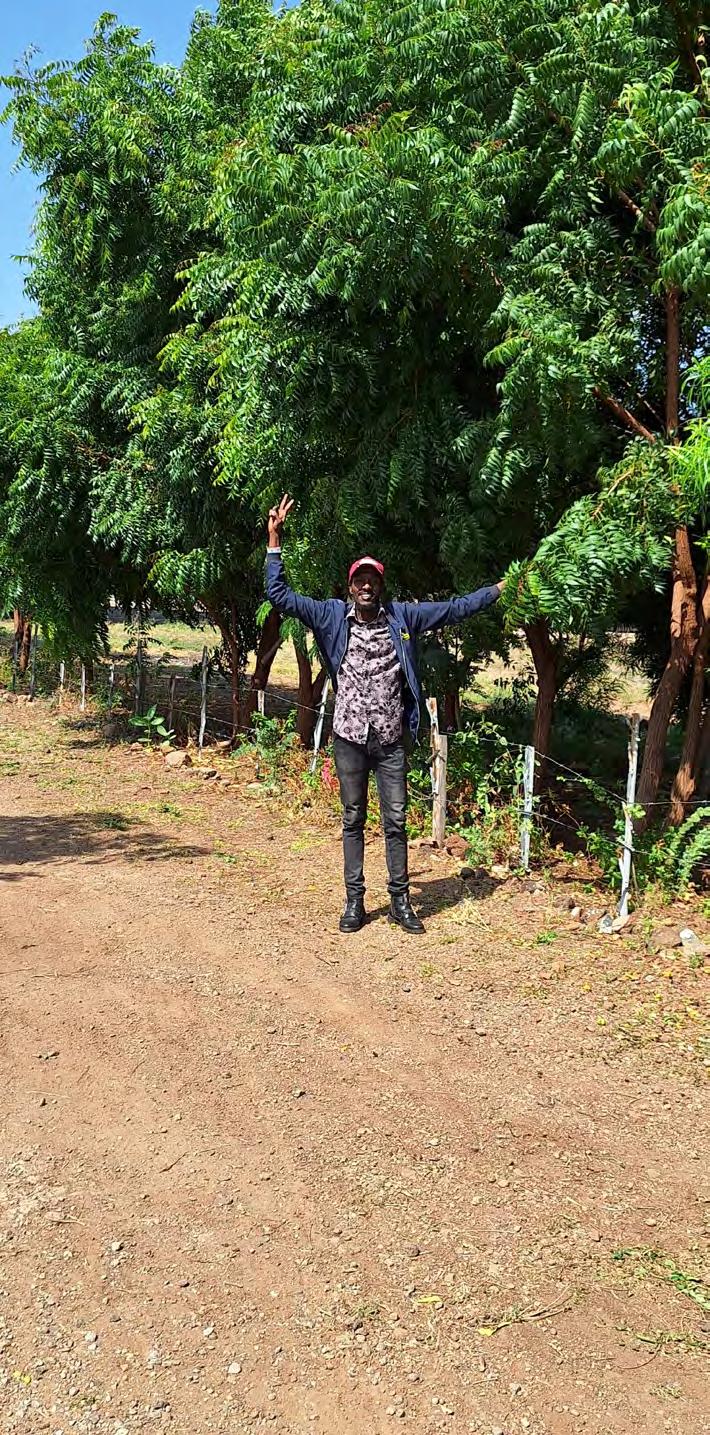
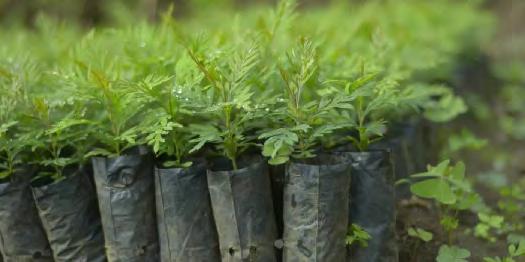
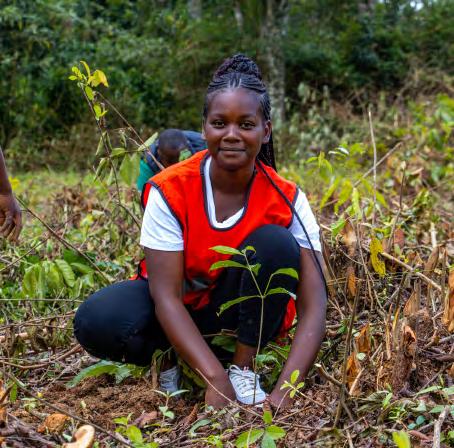
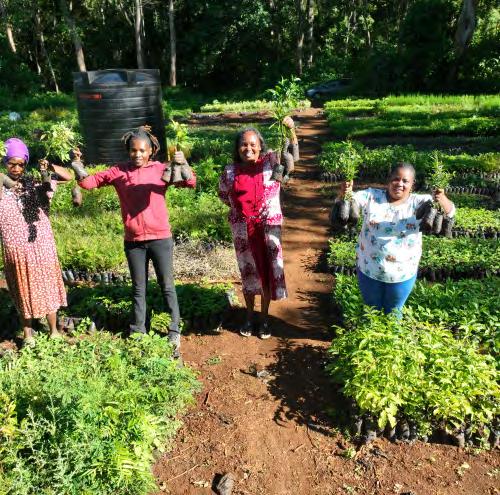
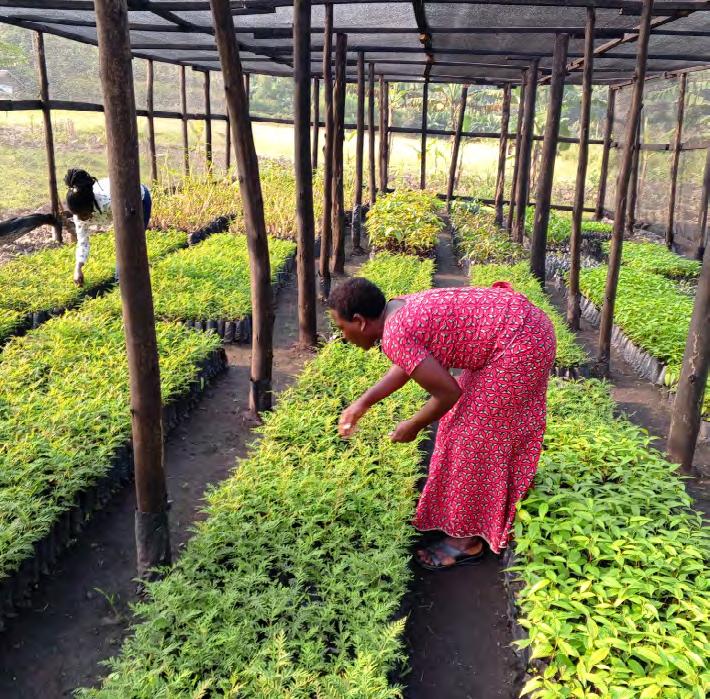
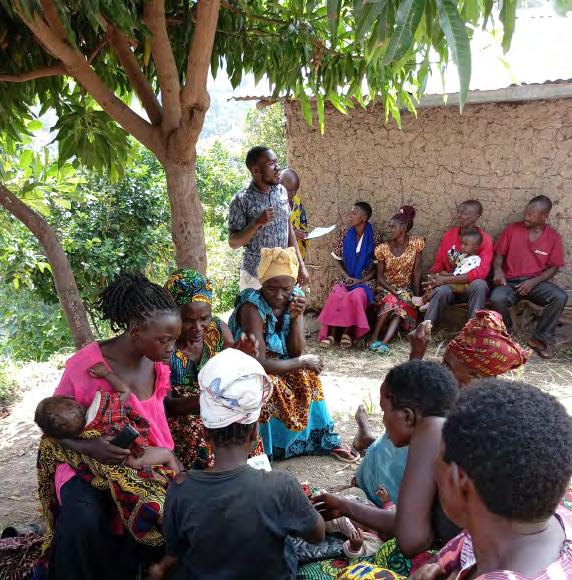
1. 51,680 trees planted with Perur Rays of Hope
2. 6,130 trees planted with Nature and People as One
3. 275,978 trees planted with Women in Water and Natural Resources Conservation
4. 150,000 trees planted with Makamia Environmental Tree Nurseries
5. 101,120 trees planted with Wezesha CommunityBased Organization
6. 160,000 trees planted with Meru Forest Conservation and Protection Group
7. 29,500 trees planted with Globe Gone Green
8. 50,000 trees planted with Irangi Forest Fireguard Group
9. 75,000 trees planted with Tharaka Children and Women Welfare Programme
10. 75,000 trees planted with Rural Initiatives Development Programme
11. 66,471 trees planted with Kitui Development Centre
12. 47,230 trees planted with We the Trees
13. 12,00 trees planted with Inuka Youth Development Organization
14 . 43,247 trees planted with Landscape and Conservation Mentors Organization
15. 91,376 trees planted with Alpha Women Empowerment Initiative
16. 6,000 trees planted with Front for Climate Change
17. 30,172 trees planted with Karambi Group of People with Disabilities
18. 29,562 trees planted with Centre for Research Uptake in Africa
19. 6,500 trees planted with Ihandiro Youth
20. 100,000 trees planted with Mount Elgon Tree Growing
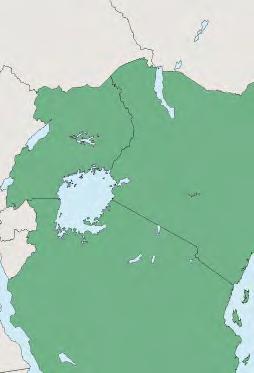

1,088,109 trees transforming land and lives in Kenya
In Kenya, we’ve been diversifying our livelihood improvement initiatives that sit alongside tree planting.
Agroforestry, bee keeping, vertical gardens, zai pits and eco-stoves are just some of the ways our projects are creating multiple impacts for communities, socially, ecologically and also economically.
These projects are creating nature-based enterprises and improving health – with farmers growing more fruits and vegetables, while eco-stoves are improving air quality in homes for thousands of families.
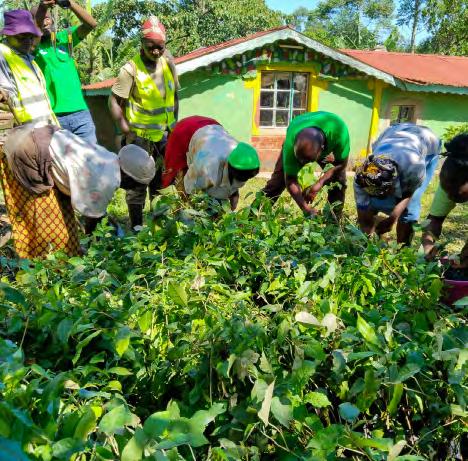
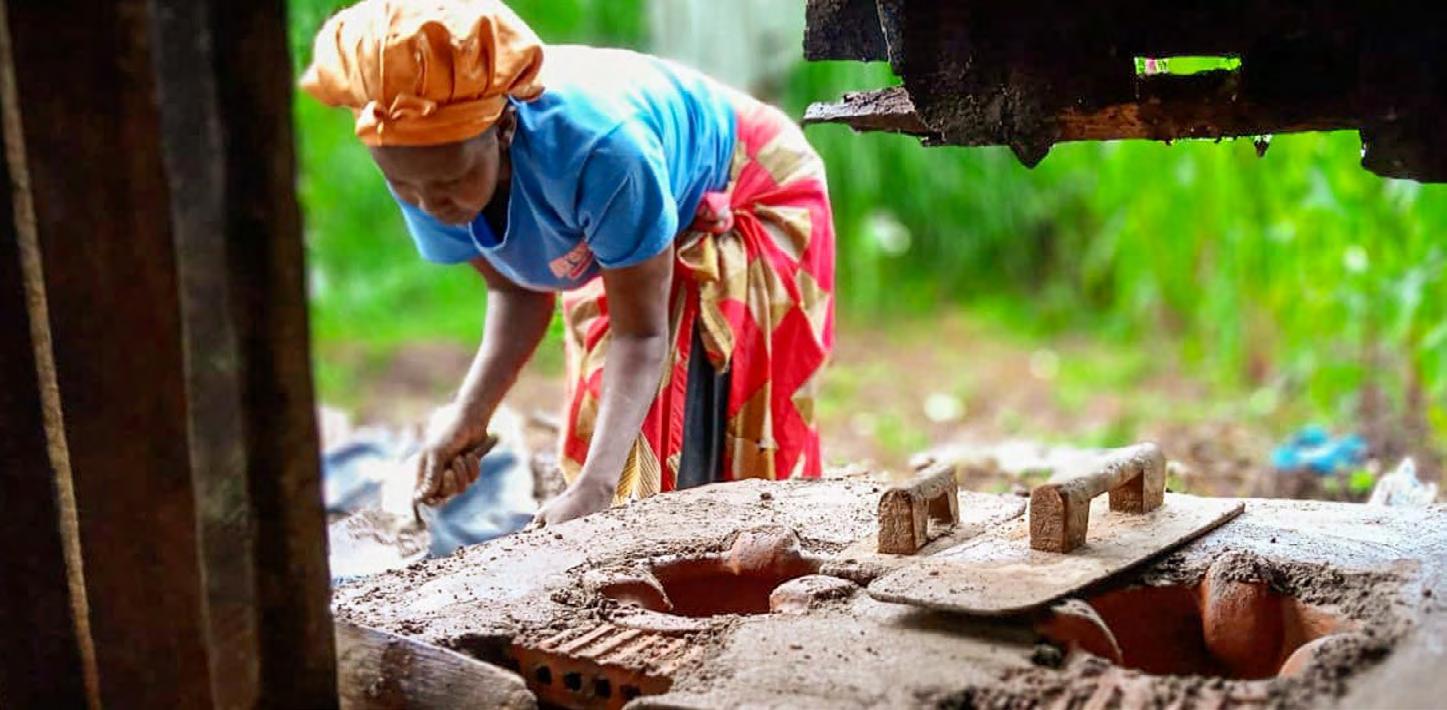
1,000 ecostoves installed this year.
Ecofriendly stoves are crafted from clay which is locally available, making them affordable and accessible for local communities. And they are more efficient than traditional stoves as they require 1 third of the firewood of the old stoves.
So, they not only help reduce pressure on forest, they also free up time for women and girls, who mainly bear the burden of fetching firewood.
Originally developed in West Africa, Zai pits are small, dug-out basins filled with organic matter that capture rainwater and runoff, allowing crops to grow in otherwise unproductive soils.
Zai pits help restore soil fertility, retain water and reduce erosion. And with the ability to support up to 20 seedlings in each pit, Zai pits increase crop yields and are a muchneeded solution for dryland farming.
“There is no woman who has stress because of the beauty of working in the nursery.”
Lucy Kananu, Upper Imenti
“I have witnessed a complete change in some of the women who have used the proceeds earned - some to buy goats, build better houses (women in this community do the building), assist in paying their children’s school fees and even better their upkeep.”
Mercy Kimani, Kenya Programmes Manager
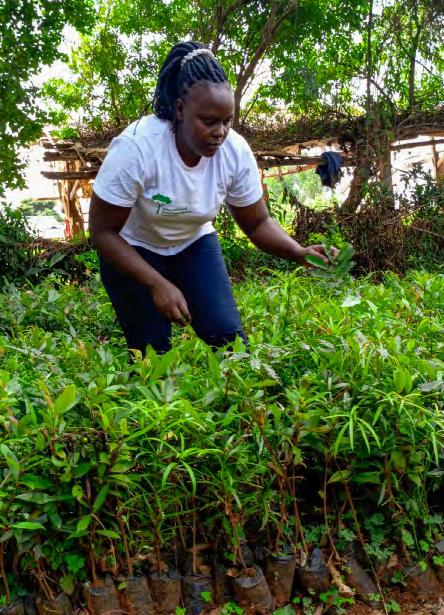
In Kitui and West Pokot lowlands, where water is often scarce and soils are poor, vertical gardens are a gamechanger.
These vertically layered gardens allow farmers to maximize space and grow a variety of crops, including vegetables, herbs and fruits like strawberries with minimal water.
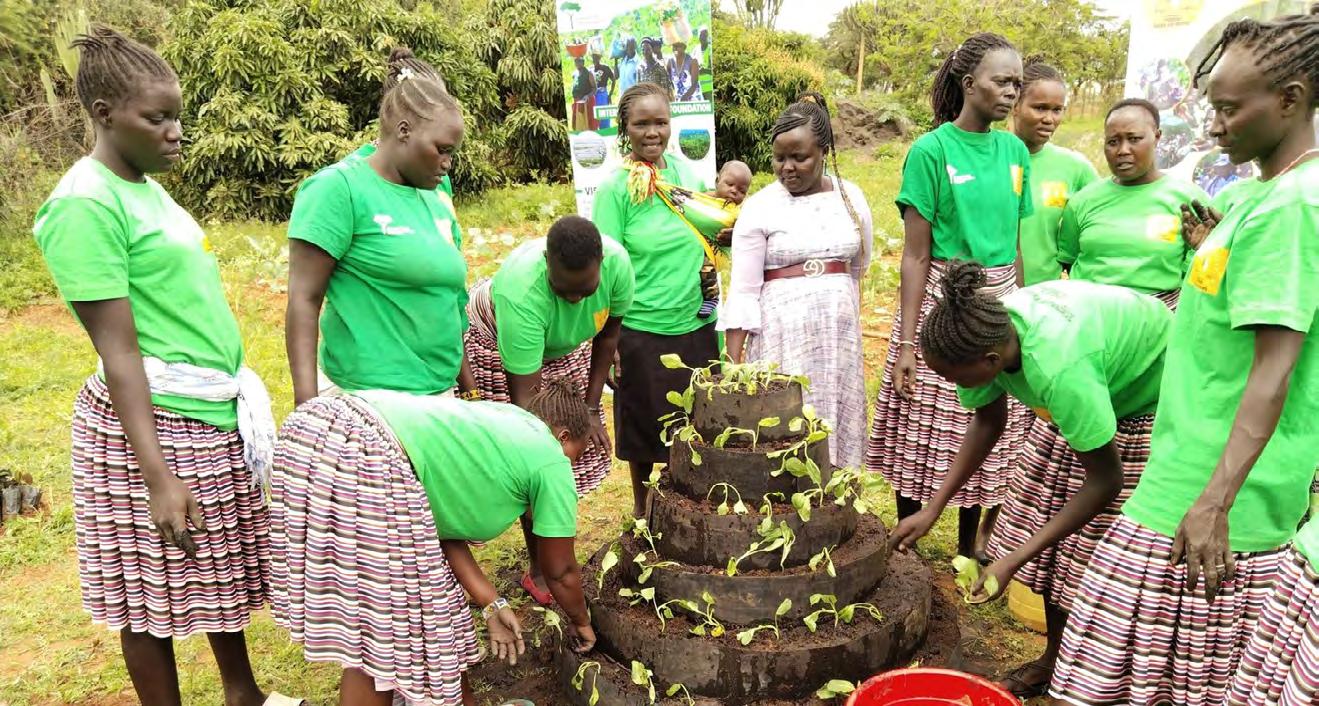
One multi-storey garden can hold up to 130 plants in just a few square feet, making it an ideal solution for households in dry climates with limited water, resources or space.
The results have been life changing for the community. One farmer in Kitui told us, “Before, we struggled to put food on the table during the dry season. Now, with my vertical garden, we always have fresh vegetables, and I’ve even started selling some at the market. It has changed our lives.”
In 2024, floods and landslides claimed lives across Kenya. These disasters demonstrate the need and demand to grow more trees. And we’re pleased to say this year has seen an upsurge in our trees planted numbers. Over 1 million trees were planted by our community partners across 12 Kenyan counties. Among these were 3 new partners who we welcomed into the ITF tree planting family.
“I am grateful to ITF for these trainings, especially on fruit grafting. Through this project, I have planted grafted mangoes and now sell to different customers. Without this support, where would I have gotten grafted trees for my farm? Buying one seedling costs 300 Kenyan Shillings, but I have planted over 30 and grafted them myself. Now, I sell fruits and seedlings, transforming my livelihood. ”
Jane Luka, Kitui
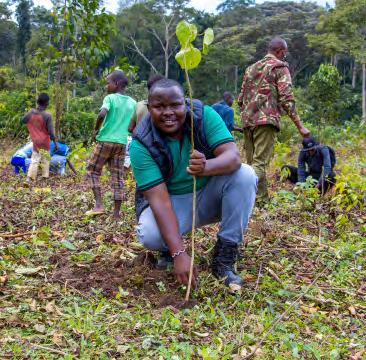

55,247
trees planted and thriving in Tanzania
Our projects in Tanzania are focused on scaling local innovations and integrating soft technologies while fostering exchange with our programmes in Kenya.
Technical support from our Kenya-based experts has strengthened capacity through on-the-ground accompaniment, training and knowledge sharing. And it has created a collaborative environment for mentorship and impact.
This partnership advanced tree and naturebased enterprises and permaculture solutions, benefiting the trees and communities alike.
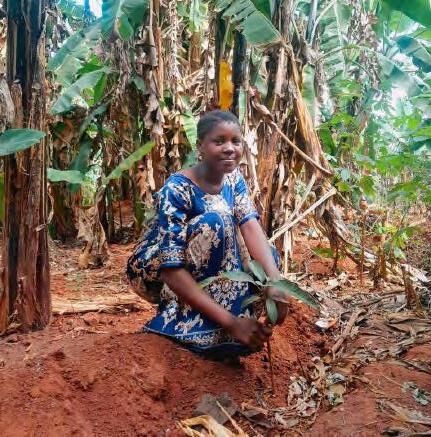
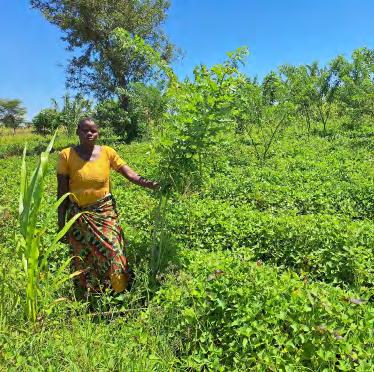
“Each tree planted is a testament to our commitment for a sustainable future in Handeni.”
Fatuma Majola, Mazingara Village
Community tree nurseries in Tanzania are propagating 12 African tree species threatened with extinction, to ensure none of these precious species will be lost.
“I am truly grateful for the opportunity to be part of this project, which has enabled us to cultivate over 1,300 Gliricidia sepium trees. These trees have not only enhanced soil fertility and reduced wind effects around our home but have also provided valuable food sources for bees. It’s fulfilling to see the positive impact our efforts are having on both our environment and our community.”
Chirstina Vitalis Malilo, Kibaoni village
Our work in East Africa is making a real difference, driving progress on 8 out of the 17 Sustainable Development Goals (SDGs).
From boosting social and economic development to managing natural resources sustainably and tackling climate change head-on, we’re creating fast and lasting impact where it makes the biggest difference.
Giving the microphone to the local community to share their experiences and stories enables them to best identify their needs and priorities. It also reveals the richness of their indigenous knowledge and local insights about risks and potential solutions.
By taking the lead and owning the projects, the community shapes meaningful outcomes and impacts. This collaborative approach creates impactful and sustainable projects which are also enjoyable. And the community knows that they are valued, in control and central to decisionmaking.
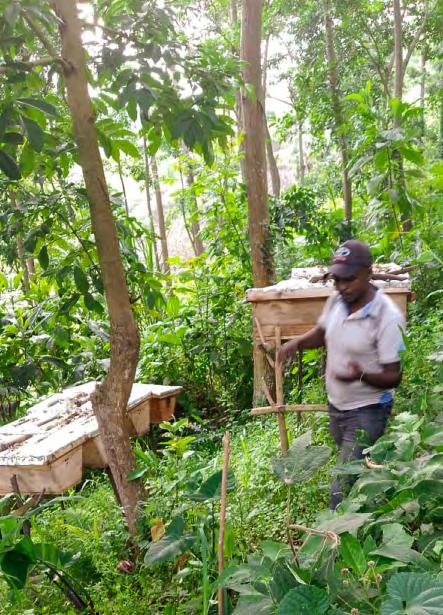
55 hectares of forest conserved or restored
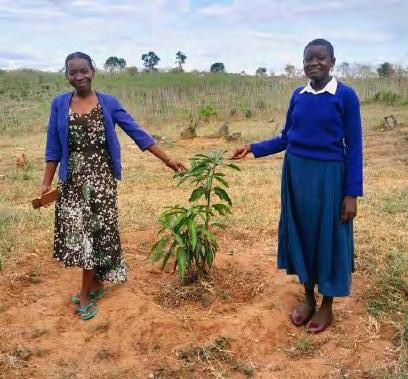

An oak tree can live for a thousand years, providing a home for more living things than any other native British tree.
The baobab tree can live for an incredible 3,000 years. It is essential to the arid savannah where it grows, recycling nutrients and protecting the soil with its massive root systems.
A gift in your will to the International Tree Foundation will let your love for trees live on.
Your gift will help to plant beautiful, lifegiving trees such as these, and ensure they are loved and protected for generations to come.
“Through the agroforestry project we are free from hunger and increase students’ attendance”
Ashura Ramadhani Said, Ufungilo Secondary School
Gifts in wills, of any amount, have a huge impact on the work that we do for people and the future of our planet.
Include ITF in your will today and protect our planet for tomorrow.
Thank you.
The survival of the trees we plant is paramount. And drones are playing a vital role in ensuring we plant trees that thrive for generations. We’re proud of our strict monitoring and evaluation protocols, which ensure that we achieve an 85% or higher tree survival rate.
But the most crucial element of our survival rates is the involvement of local communities. At ITF, we know that equipping communities to champion environmental monitoring is essential for the success and sustainability of restoration efforts.
Drone training sessions are a key pillar of our work, bringing together technology and our traditional communityled ethos to ensure our impressive tree survival rate. From basic drone handling to data interpretation, these sessions equip the drone pilots to lead monitoring efforts in their areas.
In Dundori Forest, we hosted community meetings where participants explored drone-generated maps highlighting the spread
of invasive species. These visual tools brought the issue to life, sparking meaningful discussions on how to tackle it together. Now, the community is fully engaged in restoration efforts—clearing invasive species by hand and planting native trees in the areas that need them most.
“The forest is recovering, and the community is more united in protecting and restoring it,” a local chief said of the project.
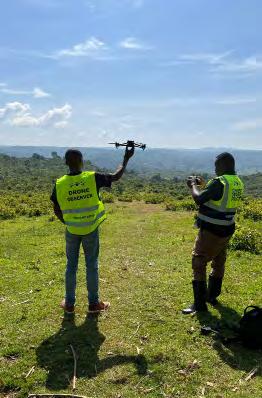
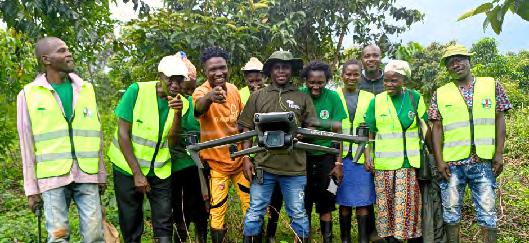
In Kakamega Forest, the focused removal of Psidium guajava, made possible by drone mapping has boosted reforestation success, restoring over 300 hectares.
Drone technology is doing more than streamlining conservation—it’s equipping communities to become passionate stewards of the environment. By involving local people in every step, from training to data analysis and planning, we’re nurturing a shared commitment to protecting our planet for generations.
Your gifts help provide training, equipment, and ongoing support that allow communities to protect and restore their ecosystems and create a lasting impact on our planet.
Thank you.
“The biodiversity in Dundori Forest has significantly improved, with various indigenous species making a comeback”
Community member, Dundori
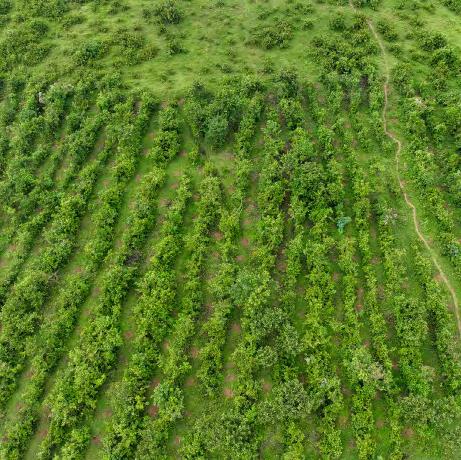

263,610 transformational trees planted in Uganda
Our holistic approach to tree planting targets the intersection of critical biodiversity and socioeconomic impacts for fast and lasting results. We are committed to “leaving no one behind,” prioritising the most marginalised, building community resilience, and fostering future environmental stewards.
In Uganda, our initiatives involve tree growing in Mount Elgon Forest, agroforestry, women’s empowerment in Kasese, a permaculture project for people living with disabilities alongside community projects which address nature and climate issues.
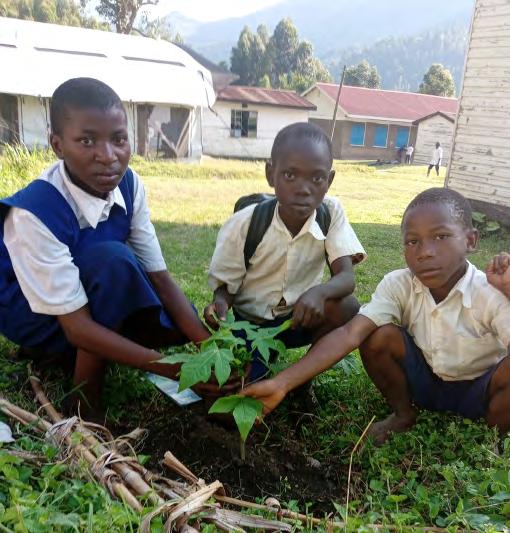
“Living with a disability hasn’t deterred me from providing for my family, and thanks to the Karambi Group of People with Disabilities, my life has transformed.
Through training in kitchen gardening and tree planting, I’ve improved our food supply, nutrition, and economic stability.
My kitchen gardens now provide nutritious meals, reduce reliance on aid, and save money for essential needs.
I feel empowered to contribute to environmental conservation and inspired by the progress in our community. This project has given me confidence, purpose, and hope for a brighter future.”
Bwahinda Edson, Karambi
244 hectares of crucial land protected or restored
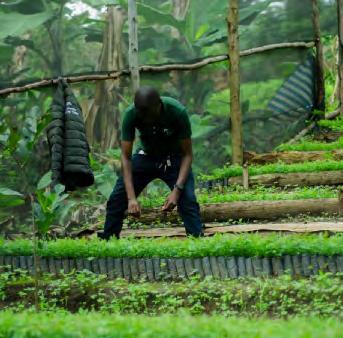
People living with disabilities face serious challenges in accessing water from rivers. And with an ever more erratic climate, well-watered trees and crops are vital.
So our projects include training on water harvesting techniques. We installed 43 water storage tanks in households of people living with a disability. And we restored four community boreholes to help provide access to clean water for local residents.
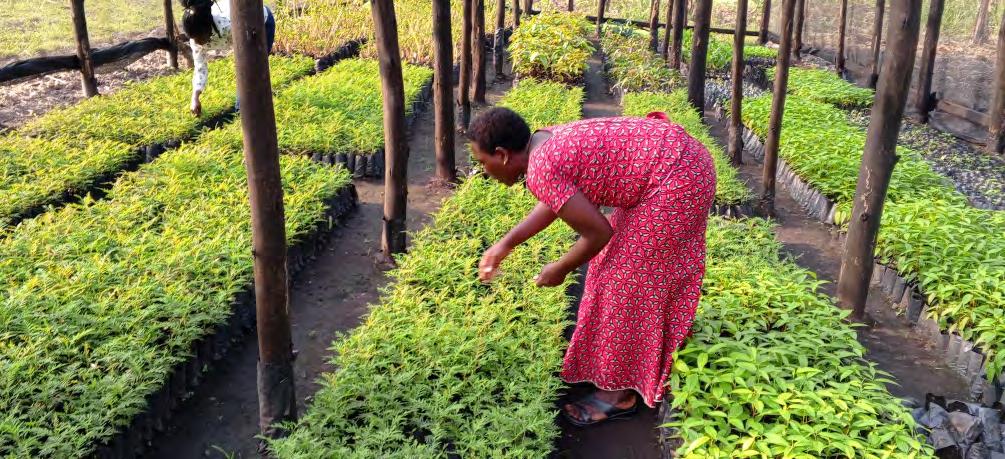
“In the past, I used to have misunderstandings with my husband due to coffee issues,” says Yozofina. “We could plant and manage coffee together but my husband would sell the coffee alone.”
In Uganda, women often do the labour of farming and harvesting coffee, but when it comes to the proceeds, they get no say. But ITF is working with local partners, AWEI, to help transform landscapes and lives.
“Me and my husband happened to be among the couples who were trained by Alpha Women’s Empowerment Initiative. We were taught about working together and equal sharing of the benefits.
“Then, after the training we came home and started implementing what we learned on working together and equal benefits sharing. We started working together in our coffee garden, harvesting, drying, and selling our coffee together. We can now plan our money together. I now feel harmony in my family.”
Yozofina’s family are developing as coffee growers, enjoying sharing the work and the proceeds. When they sell their coffee, they plan to use the money to pay their children’s school fees, giving them a brighter future.
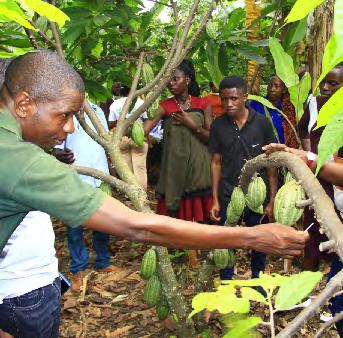
Farmers have earned a certificate from the Rainforest Alliance for their coffee, which proves it is high quality and grown responsibly. This certification helps coffee farmers in Rwenzori earn a better and fairer price in international markets and they have support connecting with buyers, making it easier for them to sell their coffee.
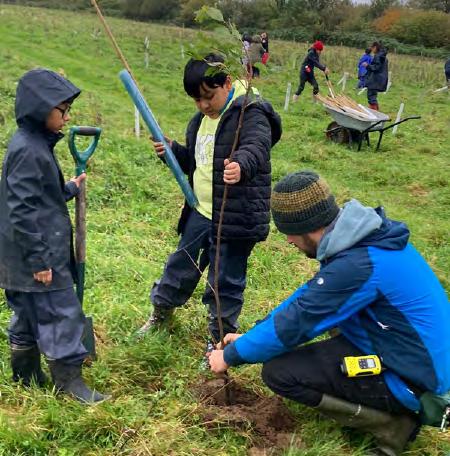
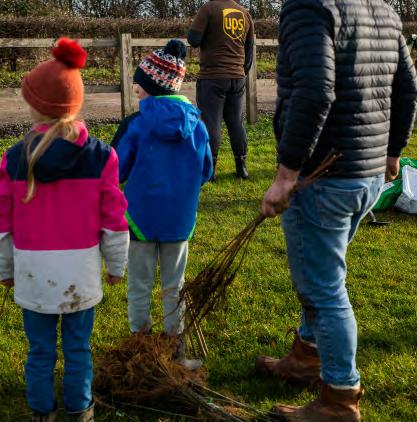
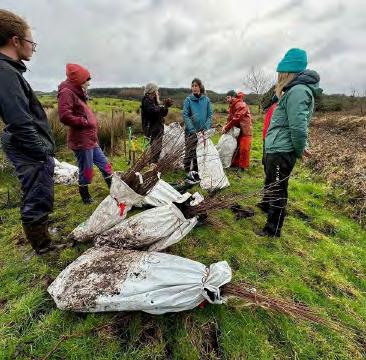
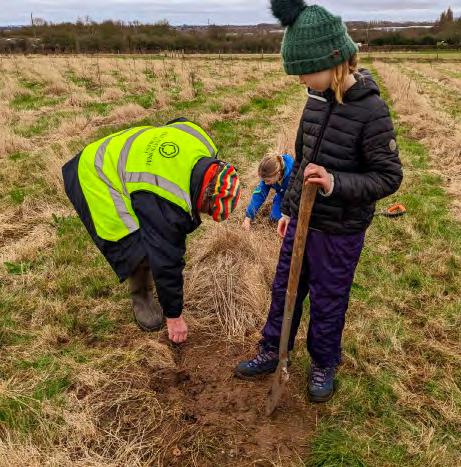
1. 1,000 trees planted with Sleat Community Trust
2. 10,000 trees planted with Uigshader Living Forest Project
3. 1,856 trees planted with Cambusbarron Community Development Trust
4. 290 trees planted with West Lothian College
5. 585 trees planted with Borders College
6. 25,633 trees planted with Lowther Estate
7. 2,450 trees with Tees Valley Wildlife Trust
8. 225 trees with Groundwork Northamptonshire
9. 846 trees planted with National Forest
10. 100 trees planted with Banbury trees
11. 1,892 trees planted with Community Trees MK
12. 2,750 trees planted with Nature and Nurture
13. 18,197 trees planted with CNC
14. 6 orchard trees planted with Oakington and Westwick Parish Council
15. 50 trees planted with Essex Wildlife Trust
16. 3,500 trees planted with Sittingbourne and Milton Regis Golf Club
17. 240 trees planted with TMActive
18. 510 trees planted with Trees for Farms
19. 600 trees planted with Boughton Monchelsea Amenity Trust
20. 25 trees with Crowborough Community Orchard
21. 1,200 trees planted with Letting Grow
22. 520 trees with Friends of Upton Country Park
23. 1,120 trees planted with Roch Primary School
24. 109 trees planted with Yarpole Parish Council
25. 10,000 trees planted with Hometree
26. 860 trees planted with Donaghadee Community Association
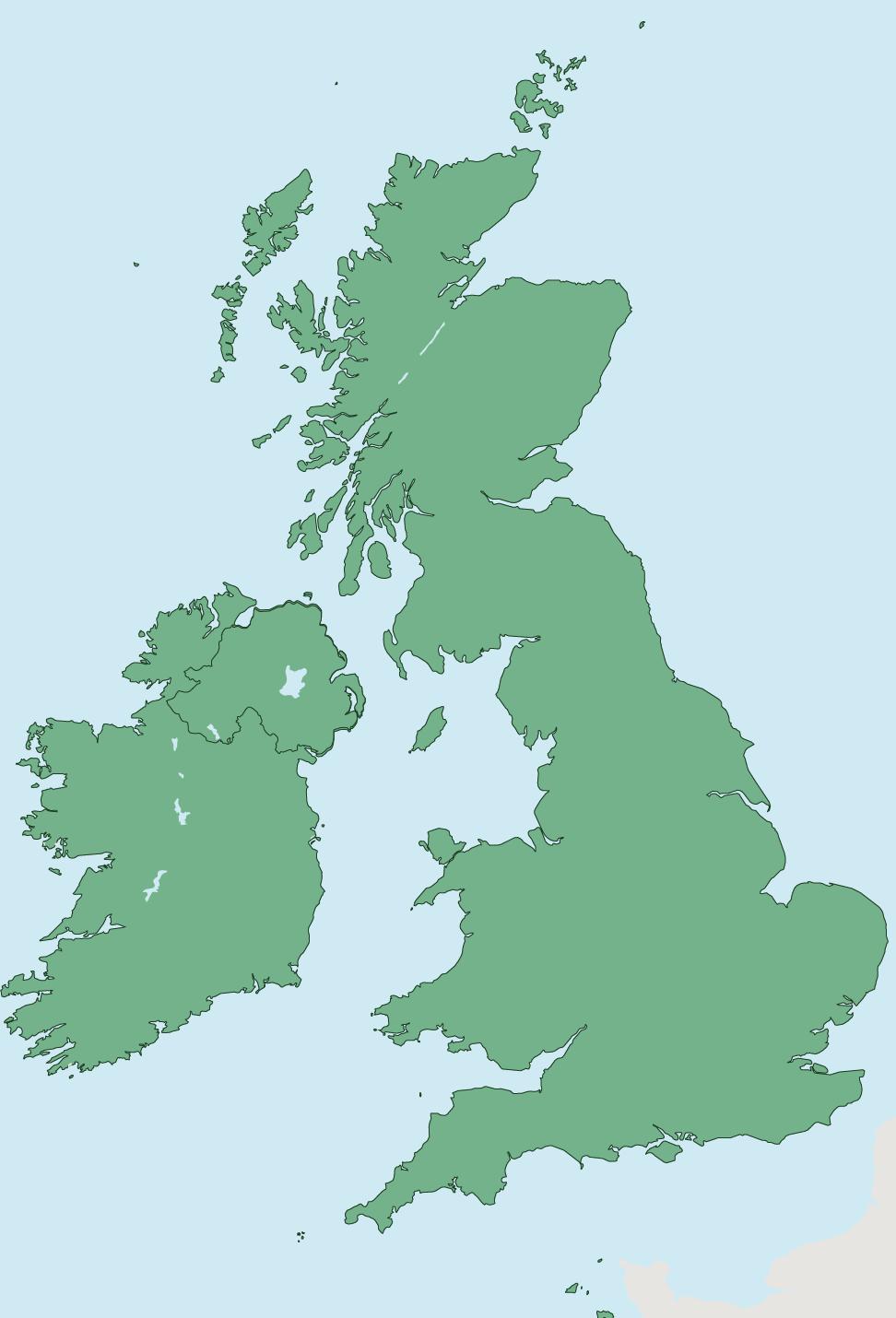

84,564
trees planted across the UK and Ireland
The demand for our work is increasing year on year. Slowly but surely communities around the UK are having their say on their local landscapes.
Communities don’t have to own land to get involved. It’s about envisioning a green future and then working with local landowners and authorities to make it reality.
The enthusiasm for community orchards, hedging and woodland projects has grown tremendously, bringing hope that one day every community in the country will have their own natural area to enjoy and manage.
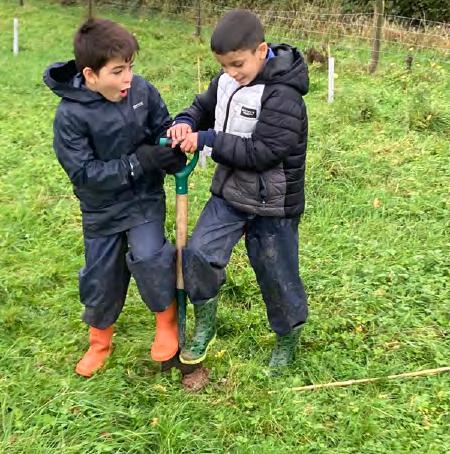
“The children were really surprised that trees take such a long time to grow, but that gave them a greater appreciation for the legacy they are leaving at Magdalen”
Teacher, The Oaks
35 projects increased vital biodiversity
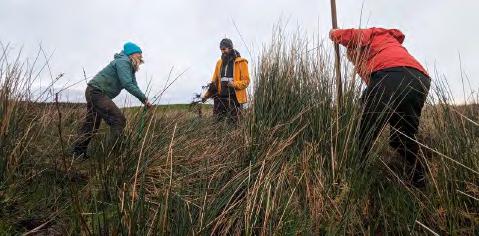
With our partners at Hometree, we planted 10,000 native trees in County Clare, near the famous Cliffs of Moher. This area was once home to vast temperate rainforests but it has suffered decades of deforestation. The new native trees are rapidly reestablishing themselves.
There are a unique set of cultural and political barriers to tree planting in Ireland. Yet it’s reassuring to see the growth of enthusiasm for tree planting up and down the country.
Over 30 volunteers joined together in the Cotswolds to plant an Optimal Shelter Belt – planting trees to provide protection from the wind and create a warm and sheltered habitat. 600 native trees of 18 different species were planted over 3 days in the landscape designated as an Area of Outstanding Natural Beauty.
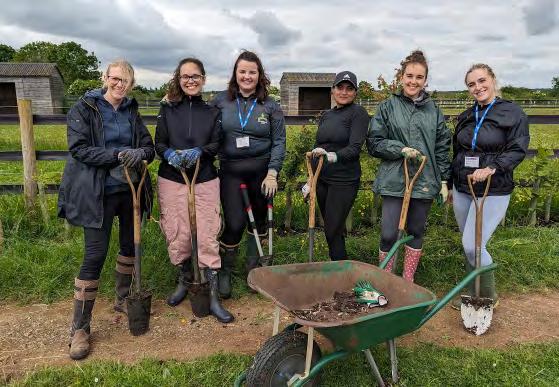
“Monitoring is a fairly time-consuming process, as you have to design sample plots and then find, photograph and identify a randomly selected sample of trees.
However, it’s always a pleasure to check in on the young trees, occasionally adjusting a tree guard or clearing the grass from the base as you go.”
Lucy Staveley, UK Programme Development Lead
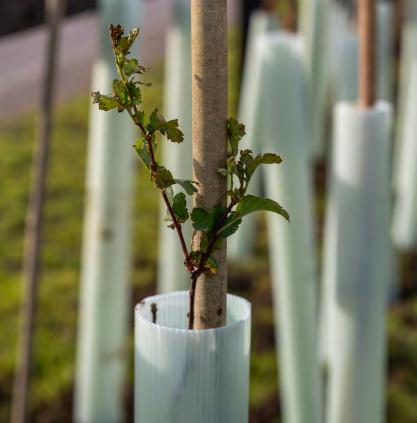
Pests and diseases in their many guises can wreak havoc on our trees. We are often approached by people looking to restore woodland where diseased trees have been felled.
One such project is replanting an area of woodland at the Blue Cross centre in West Oxfordshire. Many trees had to be taken out because of Ash dieback and the felling licence stipulated that the area be replanted to a specific density.
Working within these parameters, the project has redesigned the woodland, creating paths and glades that will provide additional habitats while at the same time making the site more attractive and accessible for people to enjoy.
In Scotland, we’re working with Cambusbarron Community Development Trust, to restore an area of community woodland affected by a devastating fungal-like organism that has decimated the UK larch population.
The project is replanting with a variety of species to regenerate the woodland and turn it into a community asset. Moving away from single species and maximising diversity leads to greater resilience in the woodland and provides a wider range of habitats for our native species.
In community tree planting projects, future-proofing against pests and diseases is crucial to ensure the long-term health and resilience of our green spaces.
We ensure quality by collaborating closely with experts and research institutions to input into best practice guidelines, including community tree nurseries. And we provide our partners with funding that enables them to invest in high quality, disease resistant stock.
Deforestation threatens us all. And it's happening at an alarming rate. But for tree-dependent communities in East Africa, the situation is catastrophic.
Temperatures are rising. Fertile land is vanishing. Natural disasters like floods and droughts are worsening. And the wellbeing, food and water security of thousands of communities are at risk.
But it's not too late. We can harness the power of trees to grow a better future. Trees are food-growers, shadegivers, crop-helpers and income-earners. They are drought-stoppers, floodfighters, air-cleaners and planet-coolers.
At ITF, we’re training small community-based organisations to plant trees where they make the fastest, most lasting difference. Trees that will restore their local landscape and prevent future catastrophes, while also providing food and income for vital things like healthcare and education.
Donate today and help more communities to restore their local landscape and transform their lives through the power of trees.
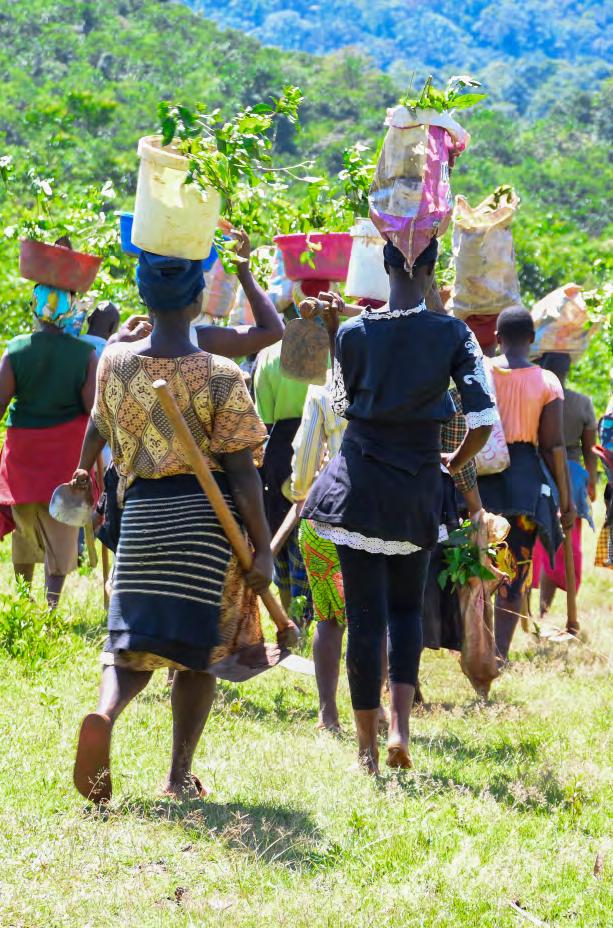
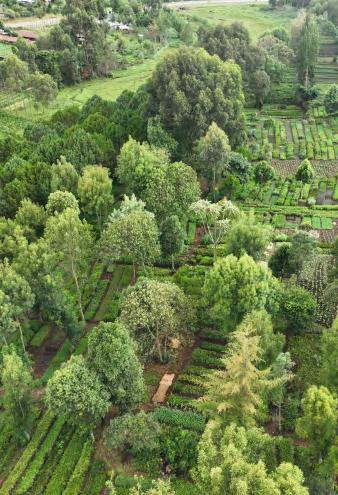
“In the words of an African proverb, ‘If you want to go fast, go alone. If you want to go far, go together.’ This saying highlights the power of unity and cooperation. It teaches us that while we may achieve quick results on our own, lasting success and enduring accomplishments are often the result of collective effort.
I extend my heartfelt gratitude to all our supporters and partners. Your unwavering commitment and dedication make our collective successes resonate and flourish.
Thank you also to Ecologi for supporting restoration in both Africa and the UK, the States of Guernsey Overseas Development Aid for supporting reforestation and inclusion, One Tree Planted for ensuring trees thrive. Daughters of the Earth and Tree Sisters for championing gender inclusion and Tresanton Trust for supporting our Africa vision.
Together we are making a lasting impact and moving towards a more sustainable future.”
Wycliffe Matika, Africa Programmes Manager